
June 17, 2015
Story was taken from summer 2015, Issue 18 of Apple Magazine. To read more stories, visit applemag.ca.
Poverty shortens people’s lives, erodes their quality of living and makes demands on countless community services, including our health-care, education, social services and legal and justice systems.
Apple writer Colleen Seto asked five prominent Albertans to imagine a poverty-free Alberta. Here’s what they had to say
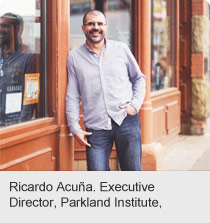 Alberta would be a significantly better place to live for all Albertans, not just those Albertans currently living below the poverty line. Our provincial finances would improve, overall quality of life would improve, and we would be able to direct energies and resources toward issues that have long been neglected or gotten short shrift.
Alberta would be a significantly better place to live for all Albertans, not just those Albertans currently living below the poverty line. Our provincial finances would improve, overall quality of life would improve, and we would be able to direct energies and resources toward issues that have long been neglected or gotten short shrift.
Extensive research shows income is a key determinant of health for people, and how they interact with the health-care system. The wealthier you are, the less expensive your interactions and the better your health outcomes. A recent study by the Parkland Institute found elevating the incomes of the poorest Albertans to the next income level would save our healthcare system $1.2 billion a year.
Eliminating homelessness would also free up resources spent on housing strategies. The combination of savings in health care and housing would provide more than enough resources to address, in a concrete and proactive way, the numerous mental health and addiction issues facing people who are poor and homeless.
Research has shown the more equitable a society is in terms of income, the better people do. As such, eliminating poverty in Alberta would lead to serious improvements in longevity, literacy, the status of women and social mobility. It would also greatly reduce crime, violence and substance abuse. This would happen among the poor as well as everyone else. For example, even the wealthy have better health outcomes in more equal societies than they do where there is greater inequality.
Looking at all these things together paints a clear picture of how, in an Alberta with no poverty, we would see improved quality of life for all Albertans. Why would we not dedicate as many resources to that endeavour as possible?
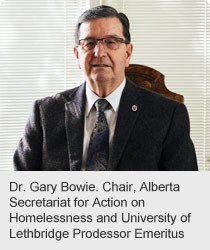 Without poverty, there would be equality and fairness for all Albertans. Everyone would have housing and a greater feeling of safety in knowing they had a place to go. I believe that makes you a citizen who’s able to contribute to the community much more. You feel a part of what’s going on, not marginalized. You’re able to be involved and give back. That’s a key component of a well-developed person.
Without poverty, there would be equality and fairness for all Albertans. Everyone would have housing and a greater feeling of safety in knowing they had a place to go. I believe that makes you a citizen who’s able to contribute to the community much more. You feel a part of what’s going on, not marginalized. You’re able to be involved and give back. That’s a key component of a well-developed person.
Being out of poverty would help people overcome ugly situations such as abuse and addictions, and devastating influences could be held to a minimum. Children and adults in a poverty-free Alberta could better develop their talents. Right now Albertans living in poverty just try to survive. There’d be more opportunities for stimulation and growth of the brain. In studies I’ve seen over the years, the earlier we can stimulate young people, the healthier and stronger their brain development. If all children were able to participate in early childhood activities, play and be stimulated, we’d see a big difference in how they turn out.
That’s all a part of being involved in balanced living; if they can be healthy physically, it promotes a healthy mental and spiritual being.
As we get all people involved in our community, it could be that much stronger and healthier. When you’re struggling with poverty, you’re putting all your time and effort there. You can’t contribute elsewhere.
Family bonds could also be strengthened. Parents would have more time and energy to help their children grow stronger mentally, physically and spiritually, and help them deal with different issues.
We need to strive to bring about more positive experiences for children and families, and celebrate the good.
We need to put forward values on helping each other out—being kind to each other and working together. I also believe that we need to talk about engendering hope. Time needs to be spent on that.
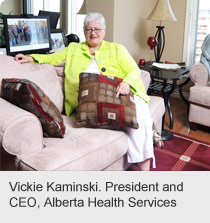 Poverty would cease to rob people of their health and livelihood. Poorer people tend to live shorter lives and are often more ill than those who are more affluent.
Poverty would cease to rob people of their health and livelihood. Poorer people tend to live shorter lives and are often more ill than those who are more affluent.
This inequity in health also places a tremendous burden on our health-care system. For our health-care system to be more efficient, the system, governments and communities will need to work together to tackle poverty and other related social determinants of health.
All the health care in the province cannot help someone be healthy and well if they don’t have a decent paying job, a safe place to live, a supportive circle of friends and family or enough healthy food to eat. Eliminating poverty would give people all this—and more. It would help reduce the incidence of many diseases, easing the demands on crowded hospitals and continuing care centres. It would give people who have been living on the margins of our communities a chance to be a bigger part of everyday life.
Eliminating poverty would make all of us healthier.
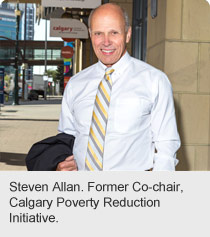 People most often think of poverty as the homeless person they see from time to time on the street. They don’t realize that people working with them in their offices may also be struggling. Many of us are so close to poverty. We may not be living below the poverty line––the low income cut off––but we’re one cheque away from it.
People most often think of poverty as the homeless person they see from time to time on the street. They don’t realize that people working with them in their offices may also be struggling. Many of us are so close to poverty. We may not be living below the poverty line––the low income cut off––but we’re one cheque away from it.
Another mindset is that people living in poverty are lazy but many are working more than one low-wage job and still can’t pay the bills. I haven’t run into anyone who’s “gaming” the system.
If we eliminated poverty, we would also eliminate biases such as this. We’d take down the roadblocks professionals from other countries face to have their credentials recognized. Right now, we have people who are well qualified and well trained driving taxi cabs when we have a high demand for skilled workers.
To eliminate poverty, we need a long-term commitment from governments to deal with the root causes of poverty. One thing I’m always bothered by is cuts to education and programming in schools. Education has a value and when you support it will cut down spending on social costs down the road. Every year, thousands of kids go from Grade 3 to Grade 4 without having the reading skills they need. Why don’t we invest resources to ensure they can read at grade level? We know there are going to be problems later.
Eliminating poverty isn’t about writing cheques. It’s about giving everyone a fair chance to have a good education, about putting services closer to communities and using what we have better.
When we worked on our initiative, we talked a lot about the income gap. Countries that have a smaller gap between rich and poor tend to have a better way of life and less poverty, drug use, teenage pregnancy and major crime. Countries with bigger gaps have bigger problems. The United States has one of the biggest gaps and they have major problems––they’re polarized around it. Calgary has the biggest income gap in Canada. We have incredible affluence and I don’t think people realize the extent to which poverty exists in our province.
But if there’s any jurisdiction in the world that can reduce poverty it’s here, despite low oil prices. Now is the best time to focus on eliminating poverty.
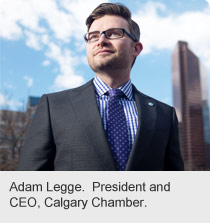 Alberta would be the most powerful jurisdiction in the world. We would have literally endless opportunity. We’d be a place of health and wellness; a place where the cost of the social safety net would be reduced so those monies could go to other things to improve quality of life.
Alberta would be the most powerful jurisdiction in the world. We would have literally endless opportunity. We’d be a place of health and wellness; a place where the cost of the social safety net would be reduced so those monies could go to other things to improve quality of life.
Alberta is already blessed with amazing resources. Quite frankly, most provinces look at us in envy and say there isn’t anything you can’t do. Imagine what we could do without poverty.
In terms of the capability of our population, we’d have more entrepreneurs, more artists, more researchers, more creativity. We would simply have more people contributing in more significant ways. With quality of life, people would be able to pursue things they are passionate about. Alberta would be a place of more invention, more patents and more firsts because some of those constraints that hold people back, just dealing with their circumstances of poverty, would no longer need to be addressed.
If we look at the cost of poverty to the local economy, Calgary-wise or provincially, it’s massive. Just in direct services, such as subsidized housing, homeless shelters and other social services—if you could reduce those costs, you would automatically free up money for people to do as they want. And communities could make more significant investments in areas such as education, infrastructure, arts and culture, and research.
We could deal more successfully with issues such as mental illness, depression, addiction and everything from heart disease to general life expectancy.
Poverty forces people to generally make poorer nutritional decisions. They would be able to make healthier choices. Poverty is such a complex issue. The conditions into which you are born highly affect where you will end up in your life. What we could do is break the cycles that show when one is born into poverty, the chances of remaining in poverty are high. Often that leads people into everything from domestic violence, suicide, teenage pregnancy to addictions and the sex trade.
You would just see such a far healthier—in the broadest sense of the term—population if we could reduce poverty.